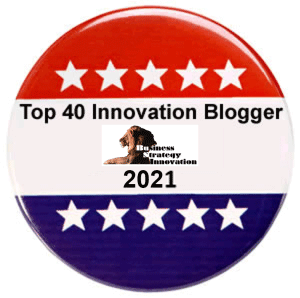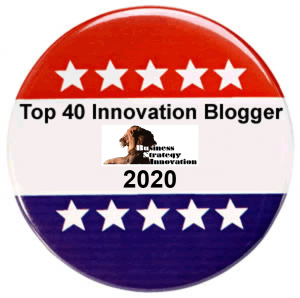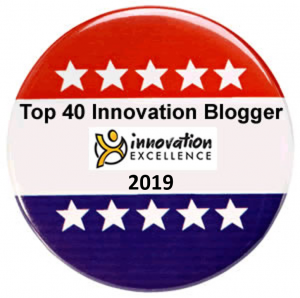It is becoming more and more apparent that we are living in a moment of profound possibility and enormous disruption. Where the old business paradigms are dying and innovative new ones are emerging, especially creating new ways of integrating people and technology through taking the path to digital transformation.
What matters most in our VUCA landscape and business environment is how we pay attention, adapt and transform whatever roles we play and organizations we are in.
To ensure that we survive, thrive and flourish, in purposeful and meaningful ways, that are valued, appreciated and cherished by the people, organizations, stakeholders, and customers we serve and the world we inhabit.
Digitization is a genuine source of competitive advantage
The Boston Consulting Groups’ (BCG) Most Innovative Companies Report 2018, states that:
Digitization is a pervasive trend across all industries
He states that the biggest mistake governments and businesses are making right now is thinking automation and technology are problems only the technology industry has to face because we all have to face it! With the rise of the digital native, technology now exists as a key enabler in almost every person’s professional domain.
The shift to digitization is difficult
The Boston Consulting Groups’ Most Innovative Companies Report 2018, suggests that we ask ourselves three key questions and they all relate to taking a strategic, systemic and human-centered approach to innovation:
- Strategy. How do we apply technologies that expand the horizons of the possible in terms of new products, services, and business models?
- Operations and Processes. How do we apply digital technologies to drive innovation, leveraging new tools, platforms, and processes (such as agile) in order to turn insights into new products and services?
- Organization. How do we transform ourselves into digitally capable organizations and cultures that can bring digital innovations to the market and make them work?
Initiating the cultural transformation
At ImagineNation™ our research, experience, and knowledge reinforce the fact that all digitization efforts, no matter how intentional and well resourced, will fail unless the operating organisational culture transforms to support their successful application.
This is reinforced by Deloitte, in their recent article “Digital workplace and culture – How digital technologies are changing the workforce and how enterprises can adapt and evolve” where they state that there has never been more pressure on companies to develop a positive, productive digital culture:
- 87% of organizations cite culture and engagement as one of their top challenges,
- 50% call the problem “very important.”
How to embrace digitization and innovation – how to do it, well, or better
The obvious first and yet uncomfortable step is to integrate the core people and technology factors. Starting by exposing and challenging people’s current operating beliefs and assumptions about the change. To then, work towards shifting people’s mindsets and be open and receptive to letting go of BAU and to what has worked in the past.
To then sense, perceive and embrace the enormous possibilities and opportunities digitization might bring to people, customers and organizations into the future by integrating people and technology.
Understanding the impact of mindsets – why mindsets matter
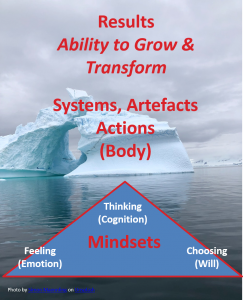 Mindsets influence the way people seek to fulfill their purpose & strategic mandate and capture how we think, feel, decide & how we act as individuals & as whole organizations.
Mindsets influence the way people seek to fulfill their purpose & strategic mandate and capture how we think, feel, decide & how we act as individuals & as whole organizations.
All organizational types demonstrate preferred mindsets which are expressed in behaviours, systems & artifacts, all of which then impact on their ability to grow and transform.
An organization’s set of collective mindsets about innovation and digitization will significantly impact on its ability to embrace and apply them as positive, productive & competitive levers in the face of disruption and VUCA times.
Quantifying and shifting mindsets
The Organizational Growth Indicator® (OGI®) outlines the 4 principal mindsets that are essential for organizations and leaders to embrace in order to grow and sustain future success through disruption.
To understand, manage leverage the impact of these mindsets, it is important to take a strategic, systemic and human-centered approach involving: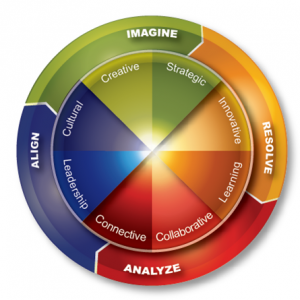
- Diagnosing and understanding what collective mindsets leaders and the organization currently utilize the most.
- Exploring where they need to shift – what collective mindsets leaders and organizations need to master if they are to adapt to & innovate with current and emergent changes.
- “Unlearning” old assumptions, beliefs and attitudes in regards to how business usually operates and functions.
- Actively rocking the boat and challenging the status quo by learning afresh how to be, think and do things differently to effectively transform and grow through disruption.
Initiating an organisational culture that supports digital transformation
BCG’s data shows that:
Taking the first steps in leading and enacting a digital transformation, which may be considered as radical, for some leaders and organizations, includes integrating people and technology by:
- Be-ing flexible and creating a psychologically safe environment where people have permission to experiment with creative ideas and make mistakes without retribution so that they are trusted to learn by “failing fast.”
- Taking simple steps to make people matter by integrating human aspects into the digital workflow, by teaching people how to better interact, communicate, team & network seamlessly with each other, despite all of the technology available.
- Ensuring that people have room to grow and feel like they are part of the team, by curating and creating digital experiences for people, so that they feel connected and included even if they are spread out across the globe.
As Atlassian co-founder Mike Cannon-Brookes, states:
“Most technology disruptions that come along generally create more jobs than they destroy,” “Almost always that they come with a huge amount of benefit for their achievements – the cheaper goods, faster deliveries, safer roads whatever it is.”
This is the first of 3 articles on embracing digitization, transformation, and innovation.
At ImagineNation™ we provide innovation coaching, education and culture consulting to help businesses achieve their innovation goals. Because we have done most of the learning and actioning of new hybrid mindsets, behaviors and skill-sets already, we can help your businesses also do this by opening people up to their innovation potential.
Find out about The Coach for Innovators Certified Program, a collaborative, intimate & deep personalized learning program, supported by a global group of peers over 8-weeks, starting October 22, 2019. It is a deep blended learning program that will give you a deep understanding of the language, principles & applications of a human-centered approach to innovation, within your unique context. Find out more.
Contact us now at janet@imaginenation.com.au to find out how we can partner with you to learn, adapt and grow your business in the digital age.

